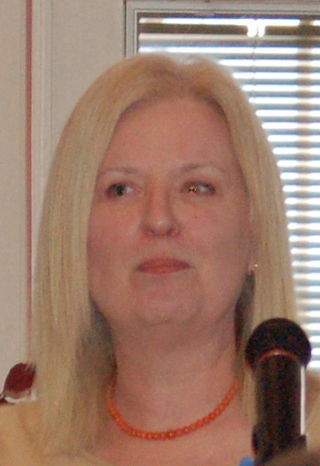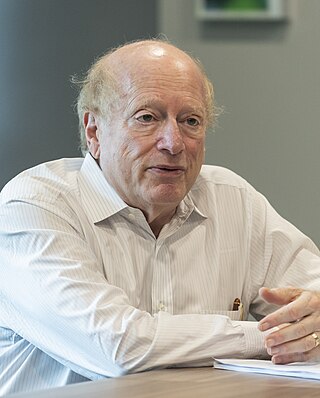Related Research Articles
Marbury v. Madison, 5 U.S. 137 (1803), was a landmark decision of the U.S. Supreme Court that established the principle of judicial review, meaning that American courts have the power to strike down laws and statutes they find to violate the Constitution of the United States. Decided in 1803, Marbury is regarded as the single most important decision in American constitutional law. It established that the U.S. Constitution is actual law, not just a statement of political principles and ideals. It also helped define the boundary between the constitutionally separate executive and judicial branches of the federal government.

The Federalist Society for Law and Public Policy Studies (FedSoc) is an American conservative and libertarian legal organization that advocates for a textualist and originalist interpretation of the U.S. Constitution. Headquartered in Washington, D.C., it has chapters at more than 200 law schools and features student, lawyer, and faculty divisions; the lawyers division comprises more than 70,000 practicing attorneys in ninety cities. Through speaking events, lectures, and other activities, it provides a forum for legal experts of opposing conservative views to interact with members of the legal profession, the judiciary, and the legal academy. It is one of the most influential legal organizations in the United States.

Randy Evan Barnett is an American legal scholar. He serves as the Patrick Hotung Professor of Constitutional Law at Georgetown University, where he teaches constitutional law and contracts, and is the director of the Georgetown Center for the Constitution.
In American political discourse, states' rights are political powers held for the state governments rather than the federal government according to the United States Constitution, reflecting especially the enumerated powers of Congress and the Tenth Amendment. The enumerated powers that are listed in the Constitution include exclusive federal powers, as well as concurrent powers that are shared with the states, and all of those powers are contrasted with the reserved powers—also called states' rights—that only the states possess.
Peter H. Irons is an American political activist, civil rights attorney, legal scholar, and professor emeritus of political science. He has written many books on the U.S. Supreme Court and constitutional litigation.

John Hart Ely was an American legal scholar. He was a professor of law at Yale Law School from 1968 to 1973, Harvard Law School from 1973 to 1982, Stanford Law School from 1982 to 1996, and at the University of Miami Law School from 1996 until his death. From 1982 until 1987, he was the 9th dean of Stanford Law School.

John Glover Roberts Jr. is an American jurist who has served as the 17th chief justice of the United States since 2005. He has been described as having a moderate conservative judicial philosophy, though he is primarily an institutionalist. For his willingness to work with the Supreme Court's liberal bloc, Roberts has been regarded as a swing vote on the U.S. Supreme Court.

Erwin Chemerinsky is an American legal scholar known for his studies of constitutional law and federal civil procedure. Since 2017, Chemerinsky has been the dean of the UC Berkeley School of Law. Previously, he also served as the inaugural dean of the University of California, Irvine School of Law from 2008 to 2017.

Thomas Eugene Baker is a constitutional law scholar, Professor of Law, and founding member of the Florida International University College of Law. With four decades of teaching experience, Baker has authored eighteen books, including two leading casebooks, has published more than 200 scholarly articles in leading law journals, and has received numerous teaching awards.

Christine Meaders Durham is an American lawyer and judge, who served as a justice of the Utah Supreme Court from 1982 to 2017, including service as chief justice from 2002 to 2012.

Ann Althouse is an American law professor and blogger.
Charles J. "Chuck" Cooper is an appellate attorney and litigator in Washington, D.C., where he is a founding member and chairman of the law firm Cooper & Kirk, PLLC. He was named by The National Law Journal as one of the 10 best civil litigators in Washington. The New York Times described him as "one of Washington’s best-known lawyers." He has represented prominent American political figures, including Attorney General Jeff Sessions, in response to the alleged Russian interference in the 2016 United States elections; Attorney General John Ashcroft; and former National Security Adviser and United States Ambassador to the United Nations John Bolton.

Patrick Errol Higginbotham is an American judge and lawyer who serves as a Senior United States circuit judge of the United States Court of Appeals for the Fifth Circuit.

Mark Victor Tushnet is an American legal scholar. He specializes in constitutional law and theory, including comparative constitutional law, and is currently the William Nelson Cromwell Professor of Law at Harvard Law School. Tushnet is identified with the critical legal studies movement.
Constitutional theory is an area of constitutional law that focuses on the underpinnings of constitutional government. It overlaps with legal theory, constitutionalism, philosophy of law and democratic theory. It is not limited by country or jurisdiction.

The Rehnquist Court was the period in the history of the Supreme Court of the United States during which William Rehnquist served as Chief Justice. Rehnquist succeeded Warren Burger as Chief Justice after the latter's retirement, and Rehnquist held this position until his death in 2005, at which point John Roberts was nominated and confirmed as Rehnquist's replacement. The Rehnquist Court is generally considered to be more conservative than the preceding Burger Court, but not as conservative as the succeeding Roberts Court. According to Jeffrey Rosen, Rehnquist combined an amiable nature with great organizational skill, and he "led a Court that put the brakes on some of the excesses of the Earl Warren era while keeping pace with the sentiments of a majority of the country."

William Hubbs Rehnquist was an American attorney and jurist who served on the U.S. Supreme Court for 33 years. Rehnquist was an associate justice from 1972 to 1986 and the 16th chief justice from 1986 until his death in 2005. Considered a staunch conservative, Rehnquist favored a conception of federalism that emphasized the Tenth Amendment's reservation of powers to the states. Under this view of federalism, the Court, for the first time since the 1930s, struck down an act of Congress as exceeding its power under the Commerce Clause.

John Francis Manning is an American legal scholar who serves as the 13th Dean of Harvard Law School. On March 14, 2024, Manning was appointed as the interim provost of Harvard University, and is on a leave of absence from his deanship. He was previously the Bruce Bromley Professor of Law at Harvard Law School (HLS), where he is a scholar of administrative and constitutional law.

Sanford Victor Levinson is an American legal scholar known for his writings on constitutional law. A professor at the University of Texas Law School, Levinson is notable for his criticism of the United States Constitution as well as excessive presidential power and has been widely quoted on such topics as the Second Amendment, gay marriage, nominations to the Supreme Court, and other legal issues. He has called for a Second Constitutional Convention of the United States.
Maeva Marcus is the director of the Institute for Constitutional Studies and a research professor of law at George Washington University Law School. She received her Ph.D. in history from Columbia University in 1975. Her dissertation, Truman and the Steel Seizure Case: the Limits of Presidential Power, published by the Columbia University Press and reissued by Duke University Press, was nominated for the Bancroft Prize, the Pulitzer Prize, and several other prestigious awards.
References
- ↑ US Enciclopedia of law, 2023
- 1 2 Duke University, faculty profile
- 1 2 The Federalist Society, 2023, Young Profile
- ↑ Duke, Office of the Provost
- 1 2 Duke University School of Law, News, 2022
- ↑ "Paul M. Bator Award Recipients". fedsoc.org. Retrieved 2024-02-21.